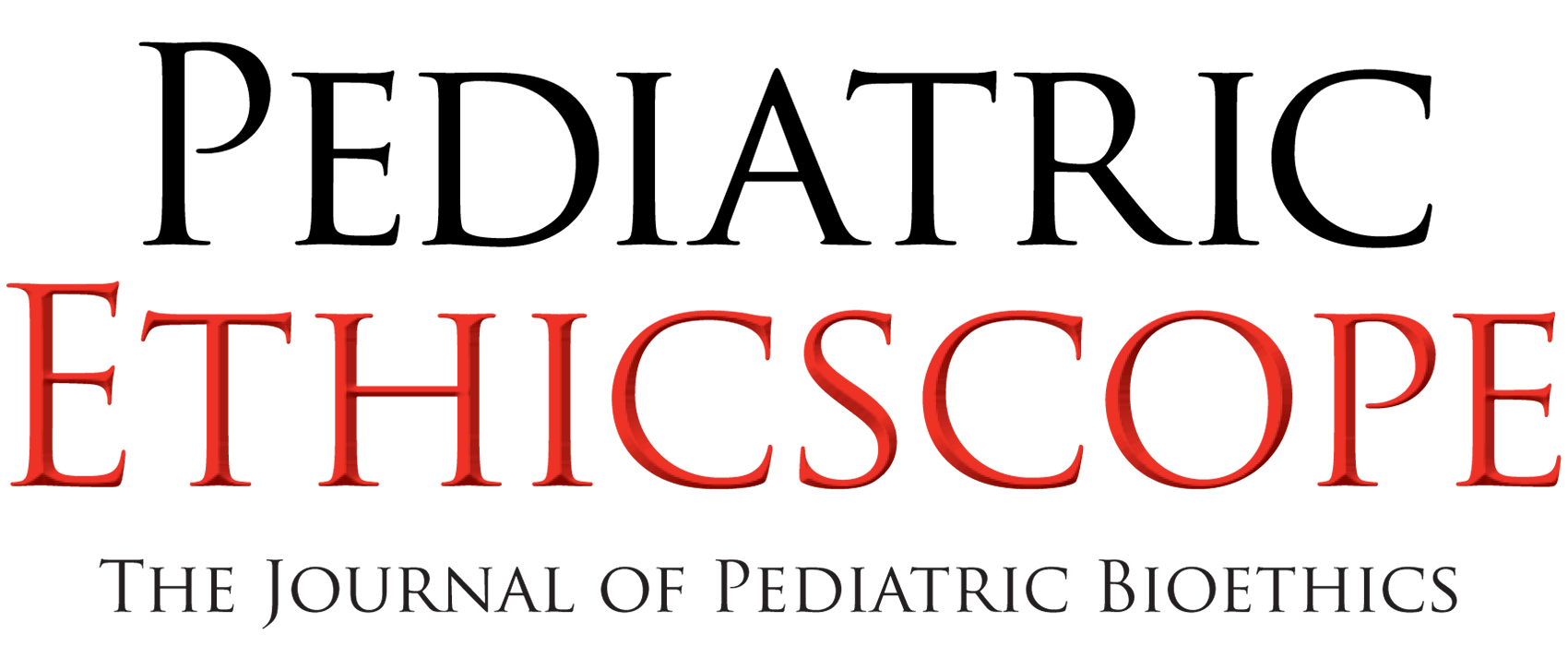
White Space
A Narrative
White Space
Aka Moore
White Space
ABSTRACT
A nurse recounts her experience as a new NICU nurse raising an issue about the appropriateness of a procedure with the rest of the medical team. The narrative addresses issues of power imbalance, ethical controversy, medical decision-making, and moral distress.
White Space
Introduction
As an ethical practice, nursing demands not only that the nurse acts in accordance to her own moral values, but is also courageous enough to voice her viewpoints to her colleagues and her patients. [1] However, courage alone cannot facilitate a true interdisciplinary conversation regarding whether or not we are doing the right thing for a patient. In order for nurses to feel comfortable raising these difficult questions, there must be an underlying culture of trust, respect, and appreciation within the team and the unit as a whole. This narrative describes the first case in which I, as a new nurse in the Neonatal Intensive Care Unit, openly questioned the appropriateness of a procedure on my patient.
White Space
Narrative
“I don’t think we’re doing the right thing” is the phrase I managed to stammer out at the beginning of interdisciplinary rounds the morning of Baby M’s emergently scheduled debridement procedure. These words halted the normal flow of rounds on a busy Sunday morning and set in motion a difficult conversation regarding what was in the best interest of the baby laying in the isolette in front of us, lines and tubes protruding from each square inch of her tiny body. Baby M was an ex–30-week-old infant transferred to our hospital with overwhelming sepsis, disseminated intravascular coagulation, bone deep abscesses across her extremities, and a devastating read on her brain MRI. What this list of diagnoses translated to in this baby was an existence that was so sensitive to any disturbance in her environment that she required multiple analgesic and anesthetic drips, pressors, and ventilation to keep her vitals stable at baseline. For routine cares she required a respiratory therapist and two nurses to increase her ventilator settings and medications in order to keep her decompensation from being unrecoverable.
Explaining my reasoning, I voiced to the team I did not feel comfortable moving forward with the debridement procedure; I felt as though the risks would outweigh the benefits. From my perspective, I saw a child who was suffering, whose best long-term outcome was a poor quality of life. From what learned about the debridement procedure from the orthopedic surgery fellow was that his team had never done it, or seen it done, on a child this size, and did not know whether it would ultimately cause her more or less pain. Adding to my distress was that the last time the parents had seen the child was a few days prior when she hadn’t been in so much pain, and I did not feel as though they understood how experimental the suggested procedure was.
Giving me the space and time to explain my reasoning, the team listened actively and offered their perspectives on why it was so difficult for them to care for this baby. The residents shared the pressure they felt to continue to find ways to make changes and suggest therapies to keep the baby alive, no matter the long-term outcome and how that stress was keeping them up at night. The charge nurse shared the perspective of other nurses who had cared for this baby and how they reported being physically sickened by the pain they felt they were subjecting the baby in just performing her routine cares. Lastly, the attending physician, who was also the chief of the unit, shared that he had also been struggling with what the right thing was to do for this child for many days. He explained that he had rationalized the joint debridement procedure as being one of the therapies we could try to use in combating her infections. Additionally, he thought that the reduction in swelling might decrease her pain. The openness and honesty of this conversation allowed me to realize that I was not alone in my concern about whether we were doing the right thing for this baby.
While I felt more comfortable ethically moving forward with the joint debridement procedure after the attending’s explanation, as a relatively new nurse in the NICU I still felt nervous doing such a novel procedure at the bedside. The charge nurse offered that if I felt uncomfortable ethically or skill-wise, she could swap my assignment with a more senior nurse. The attending offered to stay in the room during the entire procedure and authorize as much pain medication as necessary to keep her comfortable during the surgery and the respiratory therapist called for back-up so she could be dedicated to the patient during the procedure. Although it was tempting to switch assignments to avoid the intensity and difficulty of caring for baby M during the procedure, I had never before felt so empowered. After our conversation I felt supported and heard by all my colleagues and I knew I would be able to shepherd baby M through her procedure as comfortably as possible. The procedure went forward, and throughout the entire time, the attending and I communicated about Baby M’s level of comfort and what we could do to best alleviate the pain of the procedure.
Literature continues to link powerlessness and a lack of participation in decision making as contributors to moral distress in nurses. Many studies have shown in turn that moral distress ultimately leads to nurse burnout. It has been noted to compromise nurses’ “personal and professional wholessness,” affects their abilities to care for patients, and leads to leaving their jobs and potentially, their career. [2] In this case, I left my shift feeling closer to my colleagues than I had ever felt before and empowered not only as a nurse, but also an individual. Although I had taken a risk in saying that we might be doing the wrong thing, it had been a calculated risk as I knew that I worked in a culture that would engage in a conversation with me instead of one that would ignore, or worse punish, me for questioning the decisions made by attending physicians and surgeons. Had I not been able to engage in this discussion and advocate for my patient I know that my ability to continue to nurse would ultimately be compromised. I continue to feel honored and lucky to work in a unit where our focus is not only on medical status but also on holistic well-being, and where we aren’t afraid to have difficult conversations with honesty, compassion, and understanding. However, most importantly, I feel fortunate to work in a unit that allows me to realize my full scope of practice as a nurse, a true advocate for my patients, no matter how difficult.
White Space
Denouement
Literature continues to link powerlessness and a lack of participation in decision making as contributors to moral distress in nurses. Many studies have shown in turn that moral distress ultimately leads to nurse burnout. It has been noted to compromise nurses’ “personal and professional wholessness,” affects their abilities to care for patients, and leads to leaving their jobs and potentially, their career. [2] In this case, I left my shift feeling closer to my colleagues than I had ever felt before and empowered not only as a nurse, but also an individual. Although I had taken a risk in saying that we might be doing the wrong thing, it had been a calculated risk as I knew that I worked in a culture that would engage in a conversation with me instead of one that would ignore, or worse punish, me for questioning the decisions made by attending physicians and surgeons. Had I not been able to engage in this discussion and advocate for my patient I know that my ability to continue to nurse would ultimately be compromised. I continue to feel honored and lucky to work in a unit where our focus is not only on medical status but also on holistic well-being, and where we aren’t afraid to have difficult conversations with honesty, compassion, and understanding. However, most importantly, I feel fortunate to work in a unit that allows me to realize my full scope of practice as a nurse, a true advocate for my patients, no matter how difficult.
White Space
White Space

This work is licensed under a Creative Commons Attribution-NonCommercial-ShareAlike 4.0 International License.
The authors have disclosed no conflicts of interest.
White Space
White Space
Affiliations
Aka Moore, RN
Massachusetts General Hospital
55 Fruit Street Boston, MA 02114
White Space
White Space
Endnotes
1. de Raeve L. Medical authority and nursing integrity. Journal of Medical Ethics. 2002; 28: 353-357. https://jme.bmj.com/content/28/6/353
2. Fenton M. Moral distress in clinical practice: implications for the nurse administrator. Can J Nurs Admin. 1988 Oct; 1(3):8-11. https://www.ncbi.nlm.nih.gov/pubmed/3154037
